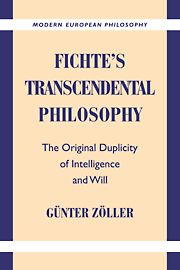Book contents
- Frontmatter
- Contents
- Acknowledgments
- Method of Citation for Fichte's and Kant's Works
- Key to Fichte's Works Cited
- Introduction
- Part I Thinking about Thinking
- Part II Knowing and Doing
- 3 Positing and Determining
- 4 Changing the Appearances
- Part III Thinking and Willing
- Part IV Pure Willing
- Notes
- Bibliography
- Index
3 - Positing and Determining
Published online by Cambridge University Press: 05 June 2012
- Frontmatter
- Contents
- Acknowledgments
- Method of Citation for Fichte's and Kant's Works
- Key to Fichte's Works Cited
- Introduction
- Part I Thinking about Thinking
- Part II Knowing and Doing
- 3 Positing and Determining
- 4 Changing the Appearances
- Part III Thinking and Willing
- Part IV Pure Willing
- Notes
- Bibliography
- Index
Summary
Fichte's project of a transcendental theory of knowledge (Wissen), which he developed under the title “Wissenschaftslehre” over a period of some twenty years, eludes classification within the traditional system of philosophical disciplines. The knowledge that Fichte seeks to elucidate in its principal structure includes theoretical as well as practical knowledge, thus pointing to the basis of knowledge of all kinds in a common ground that precedes and prepares its subsequent differentiations. Moreover, Fichte's account of the ground of all knowledge is not only concerned with the forms and structures of knowing. It is as much an account of the principal structure of that which is known in all knowledge. Accordingly, Fichte's transcendental theory of knowledge of all kinds is at the same a transcendental theory of objects of all kinds.
With its comprehensive scope and radical intentions, Fichte's Wissenschaftslehre can lay claim to the old Aristotelian title of a “first philosophy.” Yet whereas traditional first philosophy was a theory of the principal forms and kinds of being, Fichte's Wissenschaftslehre – following the precedent of Descartes and Kant – takes the form of a theory of the principal forms and the ground of the knowledge of all being. The object of first philosophy in Fichte is not being as such but the knowledge of being, more precisely, the necessary conditions of such knowledge. The epistemic turn in first philosophy, which is characteristic of transcendental philosophy in general, is more than a methodological device designed to start with what is best known.
- Type
- Chapter
- Information
- Fichte's Transcendental PhilosophyThe Original Duplicity of Intelligence and Will, pp. 43 - 54Publisher: Cambridge University PressPrint publication year: 1998

